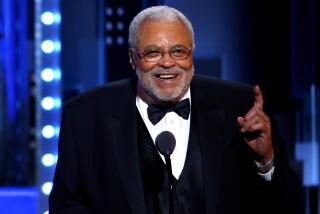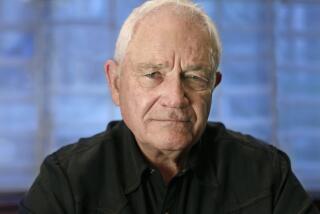Dudley Knight, innovative UC Irvine drama professor, dead at 73
- Share via
This post has been corrected. Please see below for details.
For more than 20 years at UC Irvine, Dudley Knight devised innovative and sometimes controversial ways of teaching acting students to speak clearly while lending their characters authentic, unforced accents and dialects.
Knight, who had retired 10 years ago to Pennsylvania, returned to the campus last month to begin rehearsing his role as King Lear in an outdoor summer festival production of the Shakespeare tragedy.
He had a fatal heart attack June 25, shortly after greeting friends, students, colleagues and fellow cast members during an initial get-acquainted meeting for everyone involved in the production of “King Lear.”
PHOTOS: Notable deaths of 2013
Knight died at Hoag Hospital in Newport Beach on June 27 without having regained consciousness, said drama professor Eli Simon, who as artistic director of UC Irvine’s New Swan Shakespeare Festival had cast his friend and colleague in “King Lear.” Knight would have turned 74 on July 1.
The methods he developed at UC Irvine, where he began teaching in 1981, joining the faculty full time in 1985, made him something of an iconoclast. He criticized, and offered an alternative to, a classic approach for teaching actors to speak properly that was propounded by Edith Skinner, a legendary professor at Carnegie Tech in Pittsburgh (now Carnegie Mellon University) and the Juilliard School in New York City.
Skinner taught such future stars as Kevin Kline and Kelsey Grammer, carrying on a tradition of speech instruction she’d been taught by a leading pupil of Henry Sweet, the dialect expert who was George Bernard Shaw’s model for Prof. Henry Higgins in “Pygmalion” and its musical adaptation, “My Fair Lady.” Leading dialect coaches carried on her approach after her death in 1981, and her 1942 book “Speak With Distinction” remained a standard text in the field.
Skinner taught what she dubbed “Good American Speech,” a way of pronouncing words that could serve as the default sound for roles that did not demand a specific accent. It would allow an entire company to be intelligible to the audience, while sounding as if all the characters truly inhabited the same world.
Knight raised hackles in 2000 with an article in the academic journal Voice and Speech Review that pulled no punches. The Skinner approach, he wrote, was “mired in a self-serving and archaic notion of Euphony, and in a model of class, ethnic and racial hierarchy that is irrelevant to the acting of classical texts and repellent to the sensibilities of most theater artists.”
PHOTOS: Celebrities by The Times
The response from Skinner supporters, he told The Times in an interview at the time, made for “as much sturm und drang as you get in the normally sedate world of speech and voice training.”
Believing that no one way of speaking deserved a privileged place on a multicultural contemporary scene, Knight trained his students to deliver with authority any spoken sound the human voice could produce – a full arsenal to be deployed flexibly, as their roles and artistic approaches demanded. He believed that actors taught an ideal, standard way of speaking, such as Good American Speech, could develop habits and unconscious biases that would be obstacles to a natural and distinctively individual performance.
“Fixed accent patterns – based as they are on the theatrical conventions and standards of a bygone era – are no longer appropriate,” Knight wrote in the preface to “Speaking With Skill,” the 192-page book, published last September by Bloomsbury Methuen Drama, in which he codified his method. Instead, he wrote, “actors are best served by developing a set of precise physical skills for shaping sound into articulate speech. The ways the actor will use these skills are … unique to the particular actor and the particular role.”
For teaching purposes, Knight devised an artificial language he called Omnish – after “omni,” Latin for “all,” because it included all the vocalizations in all the languages known to humanity. Students who could master Omnish, he reasoned, would be capable of saying anything well.
“He always introduced it with a deadpan sense of humor, saying it was the national language of the country of Omnia,” recalled Philip Thompson, who was Knight’s student at UC Irvine in the 1980s, then rejoined him there as a fellow drama professor in 2001. “He took the elitism out of voice training while maintaining the rigor, which is a neat trick, and he merged scientific rigor with playfulness.”
Over the last 10 years, Thompson and Knight had taught workshops in what they called Knight-Thompson Speechwork, passing on their techniques mainly to other college-level teachers who train actors.
PHOTOS: Hollywood backlot moments
“It was really important to him that we get out there and communicate this information, and I’m going to try to live up to that” by carrying it on, Thompson said. It was his mentor’s idea, he said, to include a second name in what could justifiably have been labeled Knight Speechwork. “I’ve been designing a logo with a big K and a little T, and he was saying I shouldn’t make the T so small.”
Knight, a physician’s son, grew up mainly in Connecticut, where he said he fell in love with Shakespeare at age 9, during a class outing to see Sir Laurence Olivier’s film version of “Henry V.” He graduated from the Yale School of Drama, and in the mid-1960s was a co-founder of Long Wharf Theatre in New Haven, one of the northeast’s leading nonprofit stage companies.
By the 1970s he was getting small screen parts, including “The Candidate” with Robert Redford and an episode of “M.A.S.H.,” and was taking roles on the Southern California theater scene.
He was a regular cast member of “Theater of the Air,” a radio drama series on KPFK-FM; his stage credits during the 1980s included supporting roles in “Richard III” at the Mark Taper Forum, “Macbeth” at the La Jolla Playhouse and Sophocles’ “Electra” at the Old Globe in San Diego.
During his UC Irvine years he continued to perform in summer Shakespeare festivals across the country, and he played the lead in a 1989 campus production of “King Lear.” Knight also served as a dialect coach for several plays at South Coast Repertory in Costa Mesa.
Simon said Knight and his wife, painter Marta Whistler, moved to Easton, Pa., after his retirement from UC Irvine because of its art colony and access to the New York City theater scene. Besides finishing his book and teaching his workshops, Knight continued to perform onstage and served as editor in chief of Voice and Speech Review.
At the meet and greet for “King Lear,” which began with all hands introducing themselves one by one, Knight introduced himself with a rhetorical question Lear asks when his ungrateful daughters have just begun treating him more like a pawn than a king: “Who is it that can tell me who I am?”
“We all laughed, then he said, ‘I’m Dudley Knight,’ in his very sonorous voice,” Simon said. “He was one of the funniest people I knew, yet he took his work very seriously.”
Knight seemed to be in good health at the gathering, and was stricken afterward while walking alone to the condominium next to the campus that the New Swan Shakespeare Festival had rented for him, Simon said.
“I know he died a happy man. It was a wonderful occasion, and he was surrounded by friends and colleagues and people who truly admired him.”
He is survived by his wife and her children from a previous marriage. The Aug. 2-30 run of “King Lear” will now become a tribute to Knight, with veteran Shakespearean actor Henson Keys, who recently played Lear at Arkansas Repertory Theatre in Little Rock, stepping into the title role.
Thompson said that Knight-Thompson Speechwork workshops he and his mentor had planned to give together at UC Irvine during the run of “King Lear” will go on as scheduled, and that a memorial ceremony for Knight will take place on campus Aug. 24.
For the record, July 5, 11:28 a.m.: An earlier version of this post gave an incorrect title for Edith Skinner’s book, “Speak With Distinction.”
ALSO:
A singular `King Lear’ reigns at UCI as a radical revelation
More to Read
The biggest entertainment stories
Get our big stories about Hollywood, film, television, music, arts, culture and more right in your inbox as soon as they publish.
You may occasionally receive promotional content from the Los Angeles Times.











